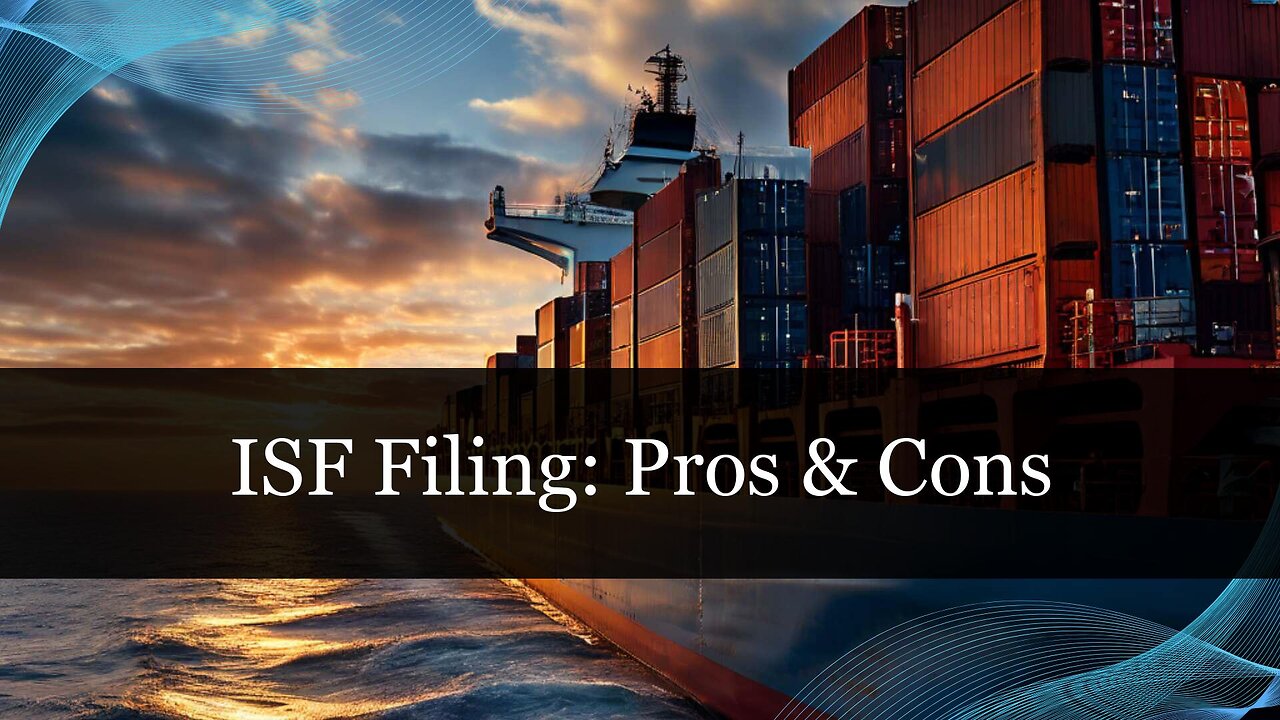Premium Only Content

Unveiling the Pros and Cons of the 10 2 ISF Filing Rule in Customs Brokerage
License To Import // 323-578-6432 // file@licensetoimport.com // www.licensetoimport.com
In this video, we discuss the pros and cons of the 10+2 ISF filing rule in customs brokerage. The ISF filing rule, introduced by US Customs and Border Protection, requires importers to provide specific information about their cargo before it is loaded onto a vessel destined for the US. The pros of the rule include increased supply chain visibility and improved risk management, as it allows customs authorities to identify potential security threats and allocate resources efficiently. However, there are also cons to consider, such as potential penalties for non-compliance and the increased administrative burden on importers. Hiring a customs broker can help mitigate some of these challenges by ensuring compliance and navigating the complexities of the clearance process. Importers should evaluate their own capabilities before deciding whether to handle the ISF filing process internally or seek assistance from a customs broker.
#usimportbond #isfcustomsbroker #uscustomsclearing #isfentry
Video Disclaimer Here: This video is solely for education and is not endorsed by any US government agency.
00:25 The ISF filing rule, also known as the 10+2 rule, was introduced by U.S. Customs and Border Protection (CBP) to enhance security measures for imports into the United States.
00:48 Pros of the ISF filing rule include increased supply chain visibility and improved risk management for customs authorities.
02:02 Cons of the ISF filing rule include potential penalties for non-compliance and increased administrative burden for importers.
02:27 Importers can mitigate these challenges by hiring customs brokers who specialize in customs regulations and procedures.
03:08 Importers should carefully weigh the pros and cons of handling the ISF filing process internally or seeking assistance from a customs broker.
-
 LIVE
LIVE
TimcastIRL
1 hour agoDemocrats SHUT DOWN Congress Blocking Censure Of Al Green, OBSTRUCT House w/Joe Redden | Timcast IRL
18,982 watching -
 1:03:27
1:03:27
Glenn Greenwald
5 hours agoUK Pressures Apple to Break Encryption in Major Privacy Clash; How Dems Can Win Back the Working Class: With Former Bernie Sanders Campaign Manager Faiz Shakir | SYSTEM UPDATE #419
30.3K31 -
 47:39
47:39
Michael Franzese
3 hours agoJewelry King Trax NYC EXPOSES How the Powerful Steal from You
32.6K5 -
 LIVE
LIVE
Slightly Offensive
3 hours agoCandace REDPILLS the Masses in BOMBSHELL Theo Von Interview | Guest: Shane Cashman
1,053 watching -
 LIVE
LIVE
megimu32
2 hours agoON THE SUBJECT: IRL Streamers Attacked & Nostalgic Animal Movies That Made Us Cry
335 watching -
 1:00:54
1:00:54
The Tom Renz Show
6 hours agoMore Epstein/FBI, a Scary Trade War, & the Dem Echo Chamber
829 -
 40:43
40:43
Kimberly Guilfoyle
7 hours agoDems Double Down on Delusion-Why? Live with Tony Kinnett & Bo French | Ep.202
61.7K30 -
 1:28:42
1:28:42
Redacted News
5 hours agoBREAKING! SOMETHING BIG IS HAPPENING IN EUROPE ALL OUT WAR IS COMING AGAINST RUSSIA, TRUMP FURIOUS
108K252 -
 47:50
47:50
Candace Show Podcast
5 hours agoBREAKING: Judge Makes Statement Regarding Taylor Swift's Text Messages. | Candace Ep 155
94.3K100 -
 LIVE
LIVE
Josh Pate's College Football Show
2 hours agoCFB’s Most Hated Teams | FSU & Clemson Future | Big Ten Win Totals | Star Rankings Overrated?
91 watching